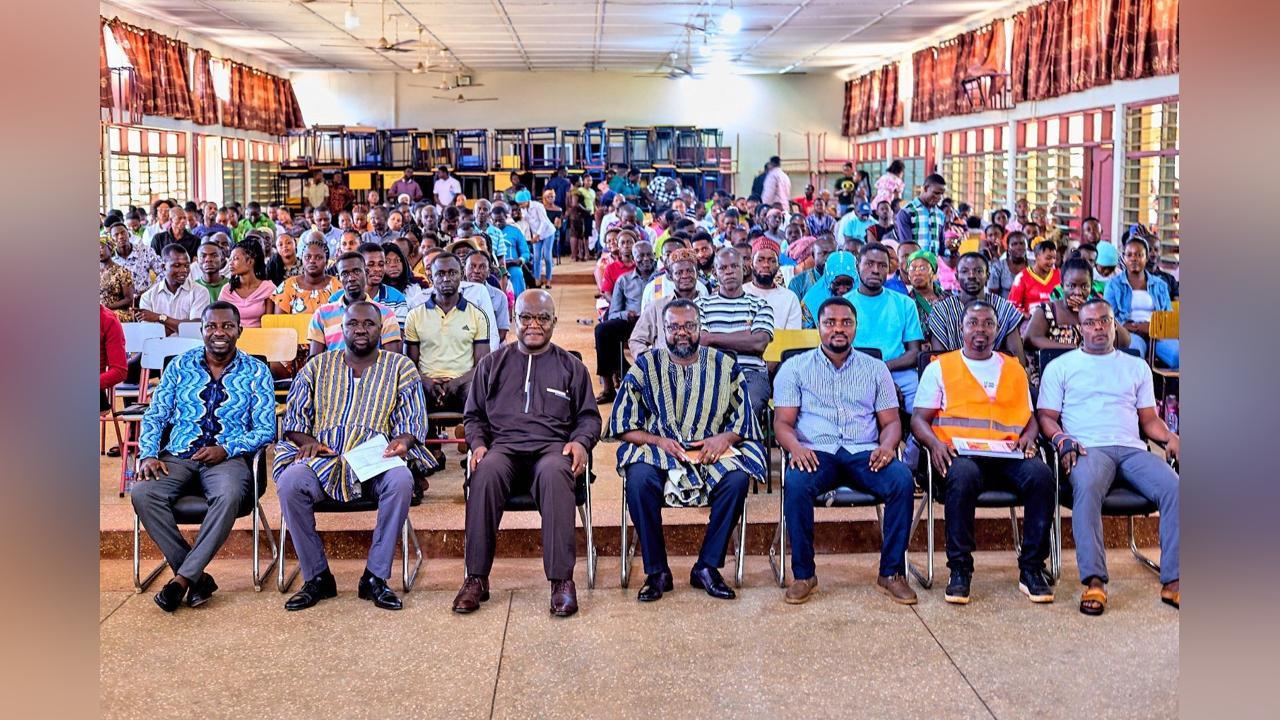Africa-Press – Ghana. Under the scorching sun of Ghana’s farming heartland, a quiet revolution is taking root. For years, smallholder fruit and vegetable farmers in the Ashanti Region have battled a relentless adversary: post-harvest losses.
Crops painstakingly nurtured from seedling to harvest are often spoiled before reaching markets, eroding incomes and dimming hopes.
Training
However, 800 farmers from across the Mampong Municipality are returning to their communities armed with something transformative – knowledge.
The Akenten Appiah-Menka University of Skills Training and Entrepreneurial Development (AAMUSTED) has become the unlikely hero in this story.
Through a meticulously designed training program, the university has introduced these farmers to affordable, innovative technologies that promise to rewrite the narrative of post-harvest despair.
The three-day workshop, pulsating with energy and anticipation, was not about techniques; it was about restoring dignity to farming.
Professor Emmanuel Dartey, the Project Director, stood before the gathered farmers, with his voice carrying the weight of years of research and field observations.
“Every season, we watch as your hard work rots away,” he stated, with his words painting a vivid picture of the crisis”.
Cool Bot/Zero Cooling Chamber Technology
“But it does not have to be this way”, Prof Dartey added when he introduced the famers to ‘Cool Bot technology’, a simple yet ingenious device that turned ordinary air conditioners into precision cooling systems.
The farmers leaned forward, some whispering to neighbors, others nodding slowly as if pieces of a puzzle were falling into place.
The training unfolded like a masterclass in practical innovation as the farmers learned how the Charcoal Fridge, a marvel of simplicity, used the natural cooling properties of water and charcoal to keep produce fresh without electricity.
They also touched the walls of the Zero Energy Cooling Chamber, feeling the damp sand that keeps temperatures low through evaporation.
In fact, these were not distant, expensive solutions reserved for commercial farms; these were technologies they could build with local materials, technologies that spoke their language.
Possibility
As the sun dipped below the horizon on the final day, the atmosphere crackled with something new possibility.
Madam Florence Adwoa Manu, her hands calloused from years of farming, clutched her training manual like a treasure.
“Before this, I would wake at dawn to rush my tomatoes to market, praying they wouldn’t spoil by noon,” she shared, her voice thick with emotion.
“Now I know how to make them last.”
Nearby, Simon Owusu, a grizzled farmer with a lifetime of losses etched on his face, made calculations in the dirt with a stick.
“The charcoal fridge”, he murmured, “I can build it behind my house. My grandchildren will eat better because of this”.
AMMUSTED Vision
Professor Dr Isaac Abunyuwah, the Principal of AMMUSTED, watched these interactions with quiet satisfaction.
“This is why AAMUSTED exists”, he reflected. “Not just to teach, but to transform.”
Behind him, the campus buildings stood as silent witnesses to a new chapter in Ghana’s agricultural story – one where knowledge flows freely from researchers to farmers, where innovation meets tradition, and where the bitter taste of post-harvest loss might soon become a fading memory.
As the farmers dispersed, their footsteps quick with purpose, the true impact of the training began to reveal itself.
Convincingly, it wasn’t about coolers and chambers; it was about restoring agency to those who feed the nation.
Way forward
In the coming months, these 800 farmers would become ambassadors of change in their communities, their successes quietly challenging decades of resignation to post-harvest losses.
And in this shift, Ghana’s agricultural landscape might just find its footing for a more secure, more prosperous future.
The training was implemented under the project “Tackling post-harvest loss in the fruit and vegetable value chain through cost-effective technologies” with support from the Ghana Skills Development Fund (GSDF).
Technical partners included Agrigrowth Africa Association represented by Dr. Benjamin Aboagye Danso and the Center for Agribusiness and Small Enterprise Development (CASMED) represented by Dr. Benjamin Sarfo.
Source: Ghana News Agency
For More News And Analysis About Ghana Follow Africa-Press







